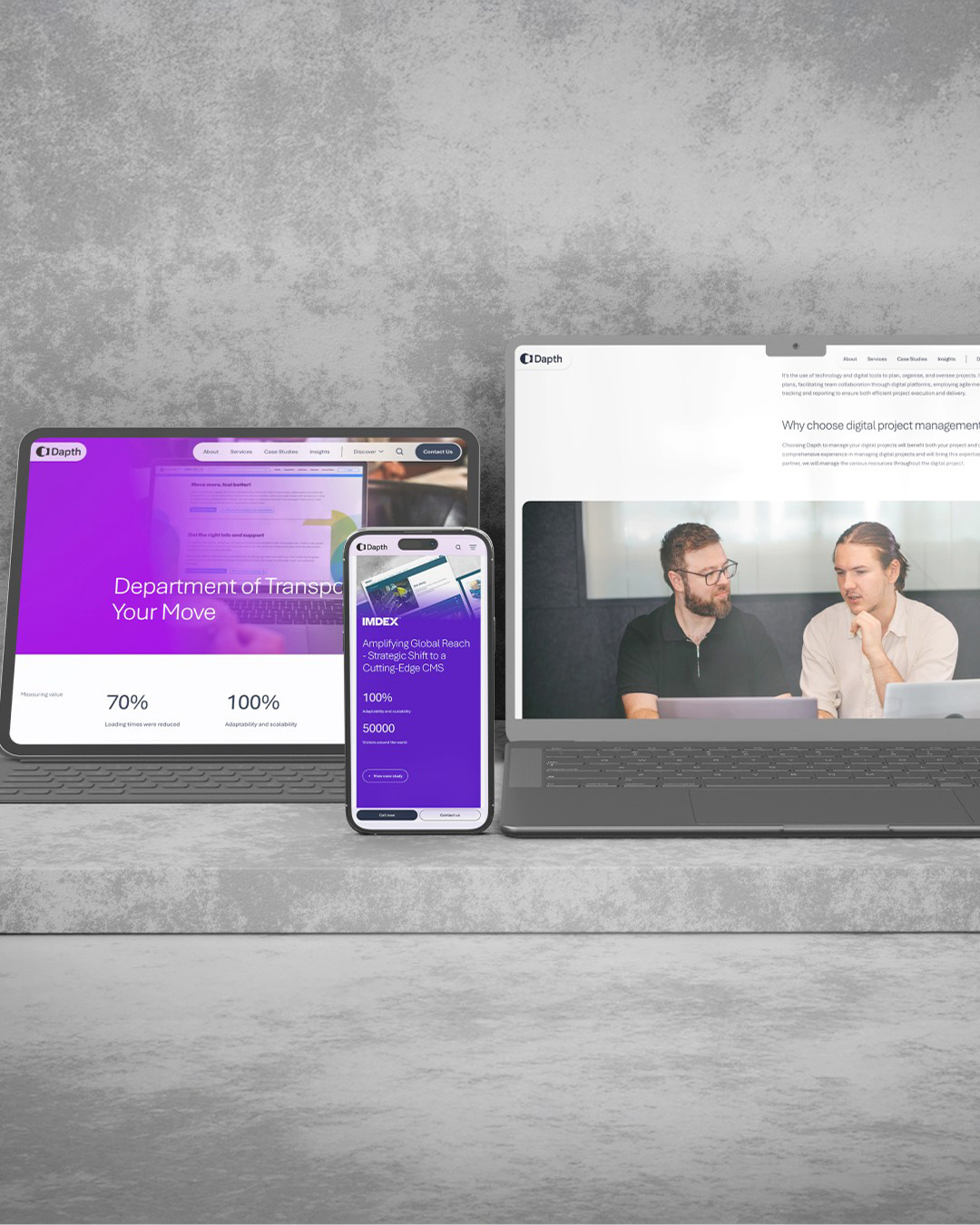
Today’s business landscape is constantly evolving, so the notion of off-the-shelf software fulfilling all organisational needs is becoming a relic of the past.
Many companies need custom software to meet their needs and improve efficiency to succeed in today's complex business environment.
With custom software development working to address specific business problems, its flexibility ensures both high relevance and effectiveness in meeting ever-changing demands.
Custom (or customised) software is the opposite of out-of-the-box solutions typically developed for the mass market. It pinpoints and addresses user-specific needs comprehensively, and is a long-term investment in productivity, efficiency, and revenue. Modern businesses need to constantly innovate and adapt to stay ‘ahead of the curve’ and custom software is an effective way to achieve this.

What Business Benefits Can Custom Software Bring?
Because of its multiple benefits, custom software development can bring significant advantages to a business.
Tailored Approach
With customers increasingly expecting personalised experiences, custom software perfectly caters to this need with its highly tailored approach. This provides custom software with the benefit of being able to constantly adapt to shifts in market trends and user preferences - adaptability is one of its key advantages.
In contrast, off-the-shelf software cannot scale and adapt in this way, or consistently match the distinct needs of a business. Off-the-shelf also falls short in scalability, demonstrating a significant incapacity to keep pace with market trends, pressures, and business landscapes.
Increased Efficiency and Productivity
Custom software development is a wise investment for the long term - significantly enhancing business efficiency. It can eradicate data silos, fostering improved communication across organisations. By integrating specialised tools relevant to the industry and merging with existing systems, it can significantly optimise processes and operations, resulting in increased productivity.
Stability and Security
Custom software provides another crucial advantage for businesses - security. Through custom software development, companies can gain full control over their data storage and management. Storing data in a safe database helps businesses prevent data breaches and unauthorised access.
The software can be set up to cipher data, guaranteeing that sensitive information remains secure (and confidential). As custom software is not widely used it isn't a main attraction for hackers.
With support, the tech support team that participated in the development process has a deep understanding of your software, which also enhances security. Stability is another advantage of custom software as it develops alongside the company's growth. Data breaches can result in significant financial and reputational harm, thus investing in custom software is a forward-thinking move.
Impact on Company Finances
While the initial investment for custom software can be substantial due to its highly tailored nature, its true worth becomes evident over time. This is because it enhances processes and boosts organisational productivity, positively affecting the company's financial health.
Custom software is often designed to enhance organisational workflow, significantly reducing the need for manual interventions and the potential for mistakes. The automation of tasks and the significant streamlining of processes also play a part in improving operational efficiency significantly.
Efficiency improvements from custom software allow businesses to distribute resources more effectively. This could involve optimising the use of equipment and infrastructure.
Scalability and Future Growth
One of the main benefits of custom software is that it can grow alongside the business, adapt to changing conditions (such as market demands, regulations, and technology). Custom software can adapt to future growth, making it scalable. Alongside the company expansion, it can handle more data, users, or functionalities. The scalability ensures it will remain valuable even as the business continues to evolve. In terms of adaptability, custom software can adapt well to ever-changing conditions – such as market demands, regulations, and technology.
Enhanced Decision-Making and Analytics
Customised analytics can assist companies in incorporating sophisticated tools specifically engineered to boost their operations. These tools might encompass predictive analytics, machine learning models, and data visualisation capabilities. By leveraging these tools, firms can derive significant insights from their data, resulting in more informed decision-making processes. Real-time data tracking allows companies to access the most recent information on various elements. This equates to the capacity to react swiftly to evolving circumstances and trends, promoting superior decision-making.
Custom software also contributes to enhanced reporting and business intelligence - as it enables the production of comprehensive reports that offer insights into every aspect of the company. The visualisation tools embedded in custom software simplify the representation of intricate data in a format that visually illustrates trends.
Strategic planning and informed decision-making are facilitated by real-time data and sophisticated analytics, resulting in improved results. This allows for the effortless pinpointing of areas that need enhancement and streamlines risk reduction. Custom software offers numerous methods to boost decision-making and analytics within an organisation.
Easier access to real-time data means that businesses can utilise highly personalised and up-to-date information on all aspects of the business. Due to its real-time nature, this translates into responding promptly towards changing conditions and trends. The integration of visualisation tools into custom software facilitates easy presentation of complex data. This leads to more informed decision-making, ultimately meaning higher quality strategic planning, and stronger outcomes. It also means easier identification of areas of improvement and makes it easier to mitigate risks.

Examples of Successful Custom Software Implementation
Whilst there are many companies who have successfully implemented custom software, two notable examples include McDonalds and Unilever.
McDonalds
McDonald's used custom software to improve customer service. They wanted to make ordering and paying, easier for customers. They created self-serve kiosks with contactless payment systems. This greatly improved the user experience (UX), increasing their sales by 50%.
Due to the automation, service times were faster and the time for taking manual orders cut down significantly. This example demonstrates how custom software development can lead to more a customer-centric approach, ultimately increasing sales.
Unilever
A case in point is Unilever's manufacturing planning and automated weighing system. The company's factory in Vietnam, which employs approximately 1400 people, is one of the most efficient production facilities in the area. The success of this factory can be attributed to its advanced production line, which is supported by technology to improve the performance of the supply chain.
Unilever has effectively developed a system for optimising manufacturing planning and automated weighing. This system assists employees in managing production lines and accurately predicting quantities.
This manufacturing planning tool, which incorporates machine learning, AI, and IoT, harnesses the power of technology. The system automatically updates and provides real-time forecasts. It also allows employees to view dashboards, receive work schedules, and keep track of assigned tasks through web and mobile applications. This has resulted in significant time savings for administrative tasks.
The Takeaway
Off-the-shelf may not always align with unique needs and requirements of business. Custom solutions offer businesses the flexibility to design and build tailor-made solutions catering to specific processes, workflows, and goals. Out-of-the-box solutions also suffer from a lack of scalability, struggling to adapt to evolving market trends, pressures, and shifting business landscapes.
Although the upfront cost of bespoke software development might be greater, the potential for long-term cost savings should not be overlooked.
If you are considering custom software, consider how it can pay off for your business - with its long-term gains in areas such as efficiency, decision-making, revenue and scalability.
Are You Ready For a Digital Revolution?
Why Dapth stands out:
- Local expertise: Based in Perth, our team offers the advantage of local knowledge combined with global standards.
- No outsourcing: We handle all aspects of your digital project in-house, ensuring quality and consistency.
- Long-term commitment: Our relationship with clients goes beyond project completion. We are committed to your long-term success and digital growth.







_web.webp)

































_web.webp)
_web.webp)
_web.webp)





_web.webp)





































